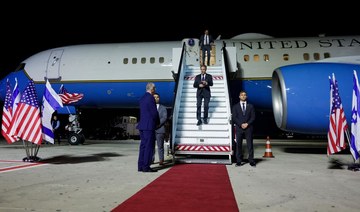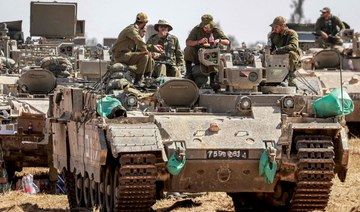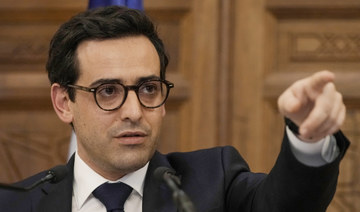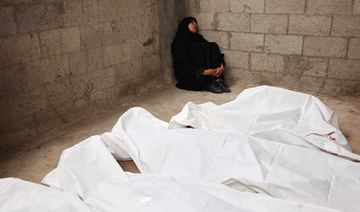PARIS: The UN's special envoy on migration in the Mediterranean, Vincent Cochetel, has accused the EU of "blindness" on the plight of refugees and migrants in Libya and called for a rethink of the policy of returning migrants intercepted at sea to the war-torn country after Tuesday night's airstrike on a migrant detention center outside Tripoli claimed 44 lives.
This is a tragic event which could have been avoided (as) we had passed on to all parties the GPS coordinates of all the detention camps.
This detention center is a former military camp. It is totally inappropriate to place people there in arbitrary detention.
We knew there was this risk of attacks one day with the risk of collateral damage, intentional or unintentional, so we had called for the closure of the center but nobody listened to us.
There is a certain blindness among European countries about the situation of migrants in Libya, which has been deteriorating for months. The recent fighting has created an even worse situation. It cannot be business as usual in terms of this cooperation on returns to Libya.
We have been repeatedly saying that people should not be returned to Libya because people disappear between the points of disembarkation and the detention centers. Some people are taken to the detention centers where they are mistreated and held arbitrarily while others end up being rented out or sold to business people.
Because it has become harder to smuggle people out of Libya by boat since the middle of last summer traffickers are trying to make a return on their 'investment' in other ways. We've received accounts from migrants who've said their families at home had been held to ransom three times to get them out of detention centers.
And now migrants and refugees can also die in these centers because they have become hostages of a political and military situation over which they have no control.
On my last visit I found cases of severe adult malnutrition. You see people who are just skin and bone, like in the camps in Bosnia or under the Khmer Rouge. The Libyan authorities say they don't have the money to feed people in detention centers -- the humanitarian people say 'it's not our responsibility because the people are held arbitrarily and we shouldn't encourage this system by feeding people'. They're both talking at cross-purposes.
We're seeing a bit of food arriving in the centers. There are two scenarios: either business people who come looking for free labour in the detention centers bring a bit of food that the detainees can prepare in return, or there are centers where people say that they have to pay for food.
In the detention centers run by the authorities, or by the NLA (the National Liberation Army of General Khalifa Haftar) in the east, there are cases of mistreatment, of beatings and injuries.
Sometimes it's a punishment, other times it's to extort money. Sometimes it's not the guards themselves who carry out acts of violence or torture: they ask detainees to carry out abuses on other detainees, namely in the case of sexual torture. The aim is to humiliate people, subjugate them, create a sense of powerlessness and impose discipline.
The worst forms of torture are carried out in the secret detention centers. The people who escaped from Bani Walid, a hub for migrants trying to reach the coast, told us of the existence of around 10 hangars where people were being held -- around 500 people per hangar, so about 5,000 altogether. There is a local religious association whom the traffickers ask to remove the bodies. There are about five bodies a week, according to recent accounts. It's appalling.
The EU's new leadership team must renew pressure on Libyan authorities and all the parties to the conflict to come up with an alternative to this system of arbitrary detention. We can help the Libyan authorities manage an alternative system of controls which does not amount to arbitrary detention.
We need a very visible and quick disembarkation system for people rescued at sea and for people to be held responsible for the way they are treated. Once the migrants are disembarked those who do not need international protection should be immediately sent back to their country of origin, with the requisite support. For those who do need international protection, there needs to be a more effective distribution mechanism than the boat-by-boat approach currently taken by the EU.
I understand that Italy, France and others have undertaken efforts to boost the capacity of the Libyan coastguard, but it has to be done through certain precise norms, including verifying how the resources are used and how the coastguard behave, etc. Most Libyan coastguard members are sailors who do a good job but there are a certain number of criminal elements involved in the process, who are acting with total impunity.
I understand Europe's strategic interests but we have to move beyond that. Have the conflicts which are spurring people to travel to Libya been resolved? There are currently 19 conflicts on the African continent. We're seeing the situation in Burkina Faso and Mali deteriorate and Sudan is completely unstable. We have these really big crises unfolding all around Libya which are creating movements of people. We have to tackle the issues upstream.
UN envoy on migrants criticizes ‘blindness’ of EU on Libya
UN envoy on migrants criticizes ‘blindness’ of EU on Libya
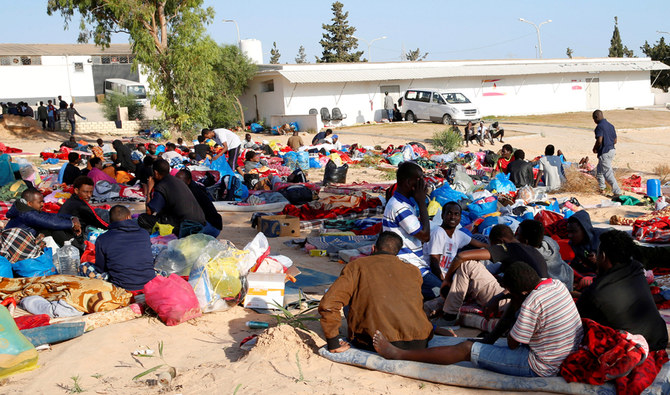
- This detention center is a former military camp
- The worst forms of torture are carried out in the secret detention centers
US surgeon in Gaza: nothing prepared me for scale of injuries
- Around 70 percent of the surgeries he performed were on injuries caused by shrapnel
- Team would deal with 40-60 patients a day
Dozens of patients a day. Most of them young. Most facing complicated injuries caused by shrapnel. Most ending up with amputations.
“Vascular surgery is really a disease for older patients and I would say I had never operated on anybody less than 16, and that was the majority of patients that we did this time around,” Shariq Sayeed, from Atlanta, Georgia, told Reuters in Cairo.
“Most were patients 13, 14, 15, 16 and 17 years of age. Mostly shrapnel wounds, and that was something I have never dealt with, that was something new.”
In his stint at the European Hospital in Gaza, Sayeed said his team would deal with 40-60 patients a day. The vast majority were amputation cases.
“And unfortunately there is a very high incidence of infection as well so once you have an amputation that doesn’t heal, you end of getting a higher amputation,” he said.
Around 70 percent of the surgeries he performed were on injuries caused by shrapnel, the rest mostly from blast injuries and collapsing buildings.
Ismail Mehr, an anaesthesiologist from New York State, who led the Gaza mission, said the volunteer medics were “speechless at what we saw” when they arrived this month in southern Gaza.
Mehr is chairman of IMANA Medical Relief, a program that focuses on disaster medical relief and health care support and has provided treatment to over 2.5 million patients in 34 countries and counting.
He has been to Gaza several times in the past, but could not imagine what he saw this time: “Truly everywhere I saw was destruction in Khan Younis, not a single building standing.”
Out of 36 hospitals that used to serve more than 2 million residents, just 10 were somewhat functional by early April, according to the World Health Organization.
Health facilities lacked medical supplies, equipment, staff, and power supplies, Mehr said. His biggest fear now is an expected Israeli assault into the southern city of Rafah, where half of Gaza’s 2.3 million people have sought shelter.
“I hope and I pray that Rafah is not attacked,” he said. “The health system will not be able to take care of that. It will be a complete catastrophe.”
UAE braced for severe weather, task force on high alert

DUBAI: Challenging weather is again expected in the UAE, with parts of the country’s east coast set to experience strong winds.
The National Emergency Crisis and Disaster Management Authority said gusts of up to 40 kph were likely to impact the area on Thursday.
While the NCM forecasts less severe conditions than those in April, it has warned residents to expect rain and storms over the next two days. There is a possibility of hail in the eastern regions, possibly extending to some internal and western areas.
Clouds are expected to decrease on Friday and Saturday, with possible light to medium rain which may be heavier in some southern and eastern regions.
Government agencies are coordinating with the Joint Weather and Tropical Assessment Team to monitor developments, said a statement from the NCM.
The teams will assess the potential impact of weather conditions and implement proactive measures where necessary.
Dubai’s government announced all private schools in the UAE would switch to remote learning on Thursday and Friday as a precaution.
Authorities have urged the public to exercise caution, adhere to safety standards and guidelines, refrain from circulating rumors, and rely on official sources for information.
The UAE is still recovering from last month’s storms which caused widespread flooding, submerging streets and disrupting flights at Dubai International Airport.
Blinken urges Hamas to agree Gaza truce as he meets Israel leaders
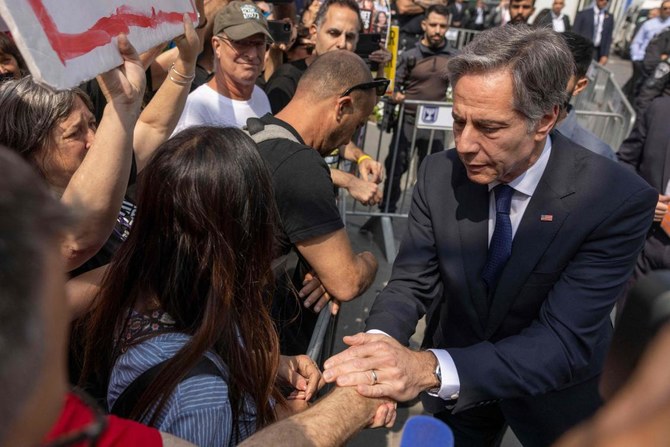
- Washington has heightened pressure on all sides to reach a ceasefire
- Israel said it would wait for Hamas’ response to the truce before sending delegation to Cairo
JERUSALEM: Top US diplomat Antony Blinken urged Hamas to accept a truce in the Gaza Strip on Wednesday, after Israeli Prime Minister Benjamin Netanyahu vowed to send troops into its far southern city of Rafah.
Washington has heightened pressure on all sides to reach a ceasefire — a message pushed by Blinken, who was on his seventh regional tour since the Gaza war broke out in October.
An Israeli official told AFP the government “will wait for answers until Wednesday night,” and then “make a decision” whether to send a delegation to indirect talks being brokered by US, Egyptian and Qatari mediators in Cairo.
The Palestinian militant group said it was considering a plan for a 40-day ceasefire and the exchange of scores of hostages for larger numbers of Palestinian prisoners.
Hamas, whose envoys returned from Cairo talks to their base in Qatar, would “discuss the ideas and the proposal,” said a Hamas source, adding: “We are keen to respond as quickly as possible.”
Blinken put the ball squarely in Hamas’s court.
“There is a very strong proposal on the table right now. Hamas needs to say yes, and needs to get this done,” he said.
But analysts questioned whether Hamas would sign up to another temporary ceasefire like the week-long truce that saw more than 100 hostages released in November, knowing that Israeli troops could resume their onslaught as soon as it was over.
“I’m pessimistic about the option of Hamas agreeing to a deal that doesn’t have a permanent ceasefire baked into it,” said Mairav Zonszein, senior analyst on Israel-Palestine at the International Crisis Group.
Zonszein said the three countries brokering the truce talks had their own reasons for trying to bounce the warring parties into a deal.
“The US and Egypt and Qatar all have very strong interests of their own, for various reasons, why they’re trying very hard now to pressure both sides into agreeing to a deal.
“And I think they believe that if they’re able to get an initial deal and a pause, that they can try to build on that,” he said.
Potential Rafah incursion
Hours before Blinken landed in Tel Aviv, Netanyahu fired a shot across his bows, vowing to send Israeli ground troops into Rafah despite repeated US warnings of the potential for heavy casualties among the 1.5 million civilians sheltering in the city.
“We will enter Rafah and we will eliminate the Hamas battalions there with or without a deal,” the right-wing premier told hostage families, his office said.
Ahead of what promised to be a difficult meeting with Netanyahu in Jerusalem, Blinken too met privately with hostage relatives in Tel Aviv.
In rare scenes for the top US diplomat, who has faced furor at home and abroad over the administration’s support for Israel in its campaign against Hamas, Blinken was greeted outside his Tel Aviv hotel by Israeli demonstrators waving US flags.
Blinken told them that freeing the hostages was “at the heart of everything we’re trying to do.”
The estimates that 129 Israelis remain captive in Gaza, 34 of whom are presumed dead.
Many of their families have expressed hope that US pressure may force Netanyahu to agree a deal for their release.
Mideast tour
On the previous leg of his regional tour in Jordan, Blinken said a Gaza truce and the redoubling of aid deliveries went hand in hand.
A truce is “the most effective way to relieve the suffering” of civilians in Gaza, he told reporters near Amman.
Blinken saw off a first Jordanian truck convoy of aid heading to Gaza through the Erez crossing reopened by Israel.
“It is real and important progress, but more still needs to be done,” he said.
UN agencies have warned that without urgent intervention, famine looms in Gaza, particularly in northern areas which are hardest to reach.
A US-built floating pier on Gaza’s coast is expected to be completed later this week, said Cyprus, the departure point for the planned “maritime corridor.”
Blinken said the pier would “significantly increase the assistance” but was not “a substitute” for greater overland access.
In northern Gaza’s Beit Lahia, across from Erez crossing, 24-year-old farmer Yussef Abu Rabih was replanting plots he said had been “completely destroyed” by the fighting.
“We decided to return to farming despite difficult conditions and scarce resources” after suffering “severe hunger,” he told AFP.
Gaza war
The war started after Hamas’s October 7 attack on southern Israel resulted in the deaths of 1,170 people, mostly civilians, according to an AFP tally of Israeli official figures.
Israel’s retaliatory offensive has killed at least 34,568 people in Gaza, mostly women and children, according to the health ministry in the Hamas-run territory.
Washington has strongly backed its ally Israel but also pressured it to refrain from a ground invasion of Rafah, which is packed with displaced civilians.
Calev Ben-Dor, a former analyst for the Israeli foreign ministry and now deputy editor for specialized review Fathom, told AFP that Netanyahu’s “Rafah comments likely have more to do with trying to keep his coalition intact, rather than operational plans in the near term.”
The prime minister “is feeling the squeeze between the Biden administration” and far-right members of his government who have vehemently opposed the proposed truce, Ben-Dor said.
UN chief Antonio Guterres said an Israeli assault on Rafah would “be an unbearable escalation, killing thousands more civilians and forcing hundreds of thousands to flee.”
French foreign minister makes unscheduled Cairo stop as Gaza truce talks intensify
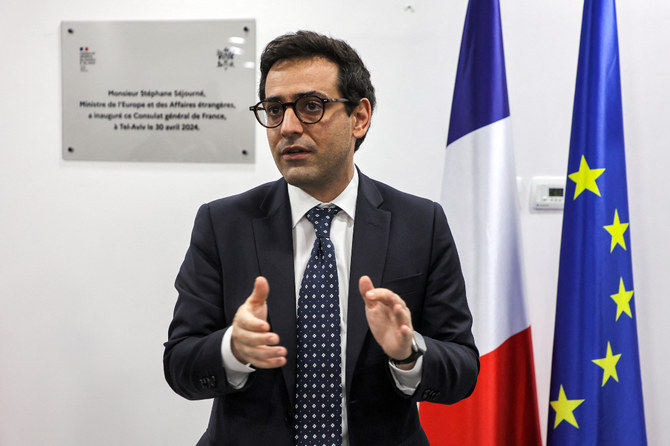
- Diplomatic efforts toward securing a ceasefire were intensifying following a renewed push led by Egypt
- France has three nationals still held hostage by Hamas after the group’s assault on Israel in October
TEL AVIV: France’s foreign minister arrived in Cairo on Wednesday on an unscheduled stop during a Middle East tour as efforts to secure a truce between Israel and Hamas and the release of hostages in Gaza reach a critical point.
Diplomatic efforts toward securing a ceasefire were intensifying following a renewed push led by Egypt to revive stalled negotiations between Israel and Hamas, Gaza’s ruling Palestinian Islamist group.
“The surprise visit of the minister is in the context of Egypt’s efforts to free hostages and achieve a truce in Gaza,” the source said.
France has three dual-nationals still held hostage by Hamas after the group’s assault on Israel on Oct. 7 and has worked closely with Cairo on providing humanitarian aid and medical assistance to Palestinians in Gaza.
Foreign Minister Stephane Sejourne’s trip to Egypt follows stopovers in Lebanon, Saudi Arabia and Israel.
In talks with Egyptian officials, he will assess whether those three hostages, who are not part of the Israeli military, could be on the list of people released and how close a deal actually is, French diplomats said, expressing cautious optimism on a potential truce deal.
Paris also wants to put a French proposal to defuse tensions between Israel and Lebanon’s Iran-backed Hezbollah high on the agenda in case a Gaza truce is agreed, diplomats said.
Sejourne, who met Israeli Prime Minister Benjamin Netanyahu in Jerusalem on Tuesday, said in an interview on Tuesday that there was some momentum toward an accord, but that it would only be a first step toward a long-term ceasefire.
He warned that an offensive in southern Gaza City of Rafah would do nothing to help Israel in its war with Hamas.
Trucks bringing bodies and detainees into Gaza hold up aid says UNRWA
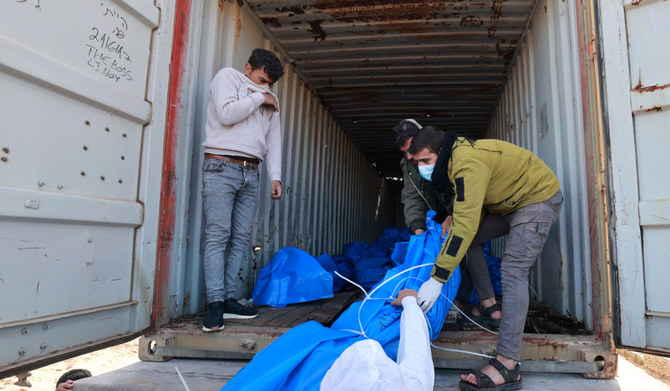
- Israel has killed more than 34,000 Palestinians, according to Gaza’s Health Ministry
- Asked for more details, UNRWA spokesperson Juliette Touma said that Israel had sent 225 bodies to Gaza in three containers since December that were then transported by the UN agency to local health authorities for burial, shutting the crossing temporarily
GENEVA: Trucks bringing both bodies and detainees from Israel back to Gaza through the main crossing point of Kerem Shalom regularly hold up aid deliveries, the head of the UN agency for Palestinian refugees said on Tuesday.
A deepening humanitarian crisis in Gaza has raised pressure on Israel to boost supplies into the enclave to curb disease among the 1.7 million people displaced by the Israeli-Hamas conflict and relieve hunger amid famine warnings from the United Nations.
UNRWA Commissioner-General Philippe Lazzarini told journalists on Tuesday that aid supplies into Gaza had improved in April but listed a series of ongoing difficulties including regular crossing closures “because they (Israel) are dumping released detainees or dumping sometimes bodies taken to Israel and back to the Gaza Strip.”
Asked for more details, UNRWA spokesperson Juliette Touma said that Israel had sent 225 bodies to Gaza in three containers since December that were then transported by the UN agency to local health authorities for burial, shutting the crossing temporarily. She did not have details of the circumstances of their deaths and said it was not UNRWA’s mandate to investigate.
On the detainee transfers, some of which have been previously reported by Reuters, she said that they had been transferred from Israel back to Gaza “dozens of times.”
Israel’s COGAT, a military branch in charge of aid, did not immediately respond to a request for comment. A spokesperson for the Israeli diplomatic mission in Geneva referred questions on the transfers to Jerusalem.
On aid deliveries, he said: “Mr. Lazzarini is deflecting from UNRWA’s own failures and responsibilities. Again today, there was a backlog of more than 150 trucks screened by Israel in Kerem Shalom not picked up by UN agencies.”
Tensions are high between Israel and UNRWA with the former accusing 19 UNRWA staff of involvement in the Oct. 7 Hamas attacks against Israel that killed 1,200 people and prompted the latter’s military campaign in Gaza. Israel’s allegations are being examined by UN investigators although a separate review found Israel has yet to provide evidence for accusations that hundreds of UNRWA staff are members of terrorist groups.
Kerem Shalom is one of just two crossings the UN says is currently open between Gaza and its neighbors Egypt and Israel.
Palestinian authorities have previously said that Israel has returned bodies from the Israeli-Hamas conflict after confirming they were not hostages. They said they were trying to identify them and figure out where they were killed.







